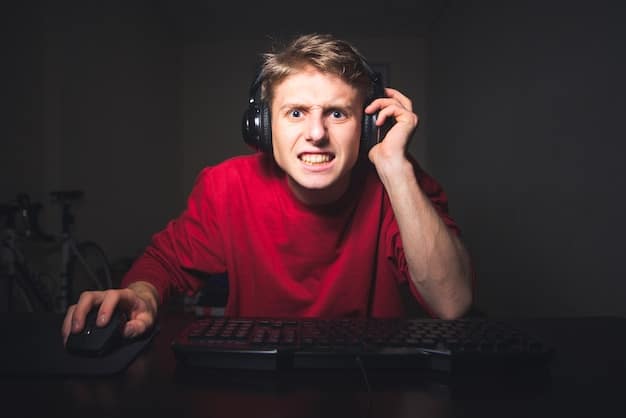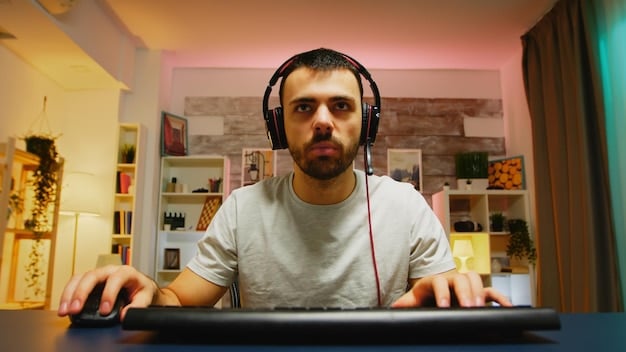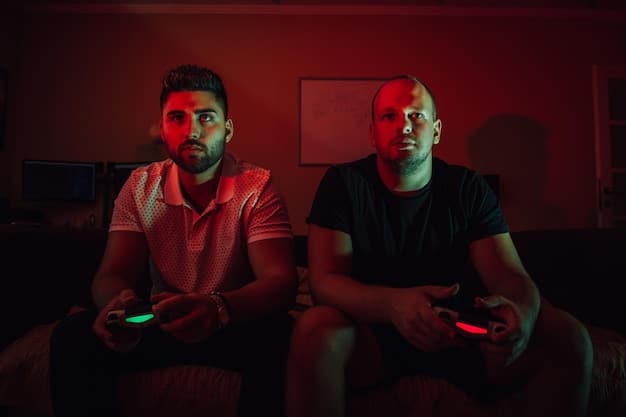Esports and Mental Health: 2025 US Resources Directory

Esports and Mental Health: Resources Available for US Players in 2025 explores the growing need for mental health support within the esports community and outlines the resources that will be accessible for US players in 2025.
The world of esports is rapidly expanding, and with it comes increased pressure and stress for players. Esports and Mental Health: Resources Available for US Players in 2025 aims to highlight the support systems being developed to address these challenges.
The Growing Need for Mental Health Support in Esports
Esports, once considered a niche hobby, is now a multi-billion dollar industry. This has led to an increase in professional players, intense competition, and high expectations. Consequently, mental health issues are becoming more prevalent among esports athletes.
The demands on professional gamers are immense. They spend countless hours practicing, strategizing, and competing, often neglecting other aspects of their lives. This dedication, while crucial for success, can lead to burnout, anxiety, and depression.
Factors Contributing to Mental Health Challenges
Several factors contribute to the rising mental health concerns within esports. These include:
- Intense Pressure to Perform: The pressure to win and maintain a high ranking can be overwhelming, leading to performance anxiety.
- Long Hours and Sedentary Lifestyle: Spending extended periods sitting and staring at a screen contributes to physical and mental fatigue.
- Social Isolation: The focus on gaming can isolate players from traditional social interactions, exacerbating feelings of loneliness.
- Cyberbullying and Online Harassment: Esports players are often targets of online harassment, which can significantly impact their mental well-being.
Addressing these challenges requires a comprehensive approach that includes raising awareness, providing access to mental health professionals, and promoting healthy lifestyle habits.
Available Resources for Esports Players in 2025
Looking ahead to 2025, several resources are becoming increasingly available for esports players in the US. These resources encompass various support systems, including mental health professionals, online platforms, and specialized programs.
Understanding and accessing these resources is essential for maintaining the mental well-being of esports athletes. These initiatives are designed to provide a safe and supportive environment for players to address their mental health concerns.

Mental Health Professionals
Access to qualified mental health professionals is crucial for esports players. Many organizations are now partnering with therapists and counselors who specialize in the unique challenges faced by gamers.
These professionals offer individual therapy sessions, group counseling, and mental performance coaching. They help players manage stress, improve focus, and develop coping mechanisms for dealing with pressure.
Online Platforms and Communities
Online platforms and communities can offer peer support and valuable information to esports players struggling with mental health. These include:
- Discord Servers: Dedicated Discord servers provide a safe space for players to connect, share experiences, and access resources.
- Online Forums: Online forums offer articles, discussions, and support groups focused on mental health in esports.
- Mental Health Apps: Mobile apps offer guided meditations, mindfulness exercises, and mood tracking tools to help players manage their mental health.
These platforms can be invaluable for players seeking support and connection with others who understand their experiences.
By providing access to mental health professionals, online platforms, and community support, efforts are being made to create a more supportive ecosystem for esports players.
The Role of Esports Organizations and Teams
Esports organizations and teams play a significant role in promoting mental health awareness and providing support to their players. Many organizations are starting to prioritize the well-being of their athletes.
These organizations are implementing various initiatives to address mental health, including providing access to mental health professionals, organizing workshops, and promoting healthy lifestyle habits.

Team Support Structures
Esports teams are increasingly aware of the importance of supporting their players’ mental health. This includes:
- Dedicated Mental Health Coaches: Some teams are hiring dedicated mental health coaches to work with players on stress management and performance enhancement.
- Regular Check-ins: Coaches and team managers are conducting regular check-ins with players to monitor their mental well-being.
- Team-Building Activities: Team-building activities are organized to promote camaraderie and reduce feelings of isolation.
By prioritizing mental health, esports organizations and teams are creating a more sustainable and supportive environment for their players.
Education and Awareness Programs
Education and awareness programs play a crucial role in destigmatizing mental health issues and promoting help-seeking behaviors within the esports community. These programs aim to educate players, coaches, and parents about the importance of mental well-being.
These programs often cover topics such as stress management, anxiety reduction, and coping strategies for dealing with online harassment. They also provide information on how to access mental health resources and support systems.
Key Components of Effective Programs
Effective education and awareness programs typically include the following components:
- Workshops and Seminars: Workshops and seminars are conducted to educate players and coaches about mental health issues.
- Online Resources: Online resources, such as articles and videos, are made available to provide information and support.
- Peer Support Programs: Peer support programs are implemented to encourage players to connect and support each other.
By providing education and raising awareness, the esports community can create a more supportive and inclusive environment for everyone.
Education and awareness programs help break down stigmas and encourage players to seek help when needed.
The Impact of Healthy Lifestyle Choices
Healthy lifestyle choices are essential for maintaining both physical and mental well-being. Esports players can benefit significantly from incorporating healthy habits into their daily routines.
These habits include regular exercise, a balanced diet, sufficient sleep, and time spent engaging in non-gaming activities. These lifestyle choices can help reduce stress, improve focus, and enhance overall well-being.
Promoting Healthy Habits
Strategies for promoting healthy lifestyle choices among esports players include:
- Encouraging Physical Activity: Promoting regular exercise, such as walking, jogging, or playing sports, can help reduce stress and improve mood.
- Promoting a Balanced Diet: Encouraging players to eat a balanced diet with plenty of fruits, vegetables, and whole grains can improve energy levels and mental clarity.
- Ensuring Sufficient Sleep: Emphasizing the importance of getting enough sleep can help players improve focus, reduce stress, and enhance overall well-being.
By prioritizing healthy lifestyle choices, esports players can improve their overall health and well-being, leading to better performance and a more sustainable career.
Future Trends in Esports Mental Health Support
Looking ahead, several trends are emerging in the field of esports mental health support. These trends include the integration of technology, personalized support, and increased collaboration between organizations and mental health professionals.
These developments promise to provide more comprehensive and accessible support for esports players in the future. Embracing these trends can lead to a more sustainable and supportive ecosystem for esports athletes.
Emerging Technologies
Emerging technologies will play a growing role in esports mental health support. This includes:
- AI-Powered Mental Health Tools: AI-powered tools can analyze player behavior and provide personalized recommendations for mental health support.
- VR Therapy: Virtual reality (VR) therapy can be used to simulate stressful gaming situations and help players develop coping mechanisms.
- Wearable Technology: Wearable devices can track player stress levels and provide real-time feedback to help manage anxiety.
These technologies offer new and innovative ways to support the mental health of esports players.
Conclusion
Addressing mental health challenges in esports is essential for creating a sustainable and supportive ecosystem for players. By providing access to resources, promoting education and awareness, and encouraging healthy lifestyle choices, the esports community can improve the well-being of its athletes. As we move toward 2025, these efforts will continue to evolve, providing esports players in the US with the tools and support they need to thrive.
| Key Aspect | Brief Description |
|---|---|
| 🤝 Professional Support | Therapists and coaches specializing in esports. |
| 🌐 Online Platforms | Discord servers, forums, and mental health apps for peer support. |
| 🍎 Healthy Lifestyle | Balanced diet, regular exercise, and sufficient sleep. |
| 🧠 Education & Awareness | Workshops and resources to destigmatize mental health issues. |
Frequently Asked Questions
▼
Mental health is critical in esports due to the intense pressure, long hours, and social isolation players often face. It affects performance, well-being, and career longevity.
▼
Resources include mental health professionals specializing in esports, online platforms like Discord and forums, and educational programs by esports organizations.
▼
Esports organizations provide access to mental health coaches, conduct regular check-ins with players, and organize team-building activities to foster a supportive environment.
▼
Adopting a balanced diet, engaging in regular exercise, ensuring sufficient sleep, and participating in non-gaming activities can significantly improve mental health.
▼
Future trends include the integration of AI-powered tools, VR therapy, and wearable technology to provide personalized mental health support to esports players.
Conclusion
In conclusion, the landscape of esports mental health is evolving rapidly, with increasing awareness and resources becoming available. By understanding the challenges and utilizing the support systems in place, esports players in the US can enhance their well-being and achieve their full potential in a sustainable way.





